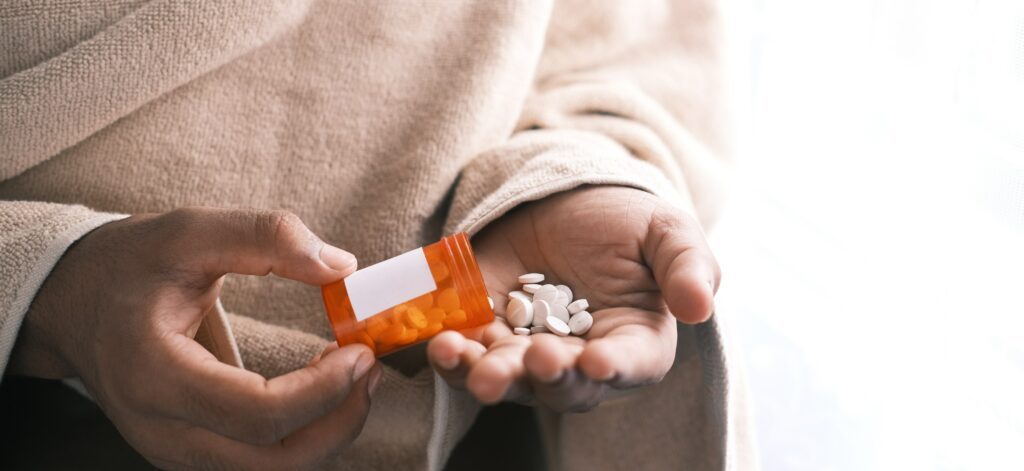Adderall is a prescription medication that is used for the treatment of ADHD (attention deficit hyperactivity disorder).
If you are wondering, “Can Adderall be addictive”, this guide explores whether it is possible to develop Adderall dependence and if you can become addicted to Adderall. Is Adderall addictive, then?
Can You Get Addicted to Adderall?
Adderall is a Schedule II controlled substance. Like all substances under this schedule, Adderall has some medical applications – treatment for ADHD – but it also has a high potential for abuse and addiction. Adderall addictions are more likely to develop when the medication is used for nonclinical purposes.
Adderall contains a combination of amphetamine salts that work by increasing the levels of norepinephrine and dopamine in the brain, neurotransmitters that are responsible for regulating attention, focus, and impulse control. When taken as prescribed, Adderall helps individuals with ADHD manage their symptoms and improve their daily functioning.
Regrettably, the stimulant properties of Adderall can also make it appealing to those seeking euphoric effects or enhanced cognitive performance. This misuse and abuse of this medication can lead to Adderall addiction, a chronic condition that is characterized by a compulsive need to use the drug despite adverse outcomes. Addiction to Adderall is clinically described as a stimulant use disorder, one of ten substance use disorders (addictions) recognized in DSM-5-TR (fifth revised edition of the Diagnostic and Statistical Manual of Mental Disorders).
Repeated use of Adderall can trigger the development of tolerance, meaning that higher doses are required to achieve the desired effects. Tolerance can eventually progress to dependence. If you become dependent on Adderall, you will need the medication to function normally. Abruptly discontinuing Adderall use will lead to the presentation of withdrawal symptoms like depression, anxiety, fatigue, and difficulty concentrating.

How Addictive is Adderall?
The risk of addiction to Adderall varies from person to person. Factors that can influence an individual’s susceptibility to addiction include:
- Genetics
- Personal history of substance abuse
- Family history of addiction
- Co-occurring mental health disorders
Abusing Adderall, especially in high doses, or combining the medication with other substances increases the risk of stimulant use disorder.
If you have been prescribed Adderall for legitimate medical reasons, it is vital to follow your healthcare provider’s instructions carefully. Open and honest communication with your prescribing physician regarding the medication’s effectiveness and any concerns you may have can help mitigate the risk of misuse and addiction.
Can Someone with ADHD Get Addicted to Adderall?
Research shows that individuals with ADHD who use Adderall as prescribed have a lower risk of addiction than those who misuse the medication. When taken as directed, Adderall can be an effective tool in managing the symptoms of ADHD and improving daily functioning.
For those diagnosed with ADHD, Adderall helps to balance the levels of neurotransmitters in the brain like dopamine and norepinephrine. These chemical messengers are involved in attention, impulse control, and hyperactivity regulation. The therapeutic use of Adderall in these individuals does not typically produce the euphoric effects sought by those misusing the drug.
When used as prescribed, Adderall helps individuals with ADHD focus better, reduce impulsivity, and improve their overall quality of life. It allows them to better manage their tasks, responsibilities, and relationships. By enhancing their ability to concentrate and stay organized, Adderall supports individuals with ADHD in achieving their goals and reaching their full potential.
That said, it is essential for individuals with ADHD to closely follow their prescribed dosage and monitor their response to the medication. If an individual with ADHD notices a diminishing response to Adderall or experiences cravings for higher doses, it is crucial to consult with a healthcare provider. They can evaluate the situation, provide guidance, and make necessary adjustments to the treatment plan.
In some cases, people with ADHD may still experience some risk factors for addiction, such as impulsive behaviors or difficulties with self-regulation. These factors, along with personal history, genetics, and co-occurring mental health conditions, can influence an individual’s vulnerability to addiction.
Adderall Addiction Treatment
Treatment for stimulant use disorders can be provided on both an inpatient and outpatient basis, depending on the severity of the addiction and the individual’s needs. In both settings, counseling is a crucial component of the treatment process.
Here are some behavioral therapies commonly used in the treatment of stimulant use disorders like Adderall addiction:
- CM (contingency management): This approach utilizes positive reinforcement and rewards as incentives to promote abstinence from stimulant use. Patients may receive tangible rewards like vouchers or privileges, for achieving drug-free milestones, such as passing drug tests or attending counseling sessions.
- CBT (cognitive behavioral therapy): CBT helps individuals identify and modify the thoughts, beliefs, and behaviors that contribute to their drug use. It focuses on teaching patients coping skills to manage cravings, identify triggers, and develop healthier ways to cope with stress and difficult situations.
- MI (motivational interviewing): MI is a form of motivational therapy that focuses on enhancing the individual’s intrinsic motivation and readiness to change their drug use behavior. The therapist works collaboratively with the patient to explore their ambivalence and resistance to change, while highlighting the importance of personal goals and values.
These behavioral therapies can be used individually or in combination, tailored to the individual’s needs and preferences. They are designed to address various aspects of addiction and promote long-term recovery from stimulant use disorders. Treatment plans may vary depending on the specific program or facility and the individual’s unique circumstances.

Get Treatment for Adderall Addiction at Gratitude Lodge
At Gratitude Lodge rehab in Long Beach, CA, we specialize in the outpatient treatment of substance use disorders, including Adderall addiction. Our programs include detox, inpatient treatment (IP), and dual diagnosis treatment programs for co-occurring disorders.
Our holistic and evidence-based interventions include medication-assisted treatment, group, and individual counseling, psychotherapy (CBT or DBT), family therapy, and holistic therapies.
After completing your treatment program, you can transition to less intensive care or sober living in Southern California. We provide an aftercare plan with coping techniques and relapse-prevention strategies to support your ongoing recovery. Contact our admissions at 800-994-2184 to take the first step toward recovery.




























